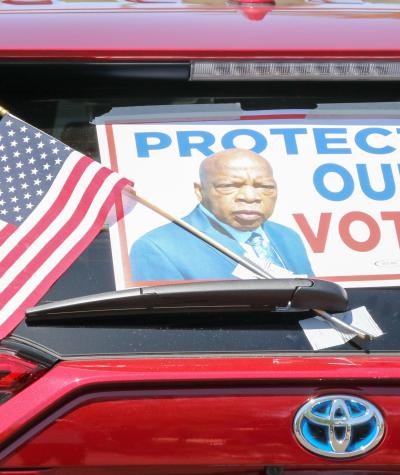After years of struggle and devoted advocacy by civil rights leaders, the Voting Rights Act (VRA) was finally signed into law on August 6, 1965. This landmark legislation transformed American democracy and ended an era of rampant discrimination against Black Americans and other voters of color in our elections.
But, over the last decade, the Supreme Court has gutted the VRA and drastically weakened its once-successful protections for voters of color — a situation Congress has repeatedly failed to fix despite having the ability do so.
Now, six decades after the original VRA became law, Congress has another chance.
Led by Representative Terri Sewell (D-AL), Senator Raphael Warnock (D-GA), and Senator Dick Durbin (D-IL), the John Lewis Voting Rights Advancement Act (JLVRAA) has officially been reintroduced in both chambers. Named after the late civil rights icon, this vital bill would help restore the full strength of the VRA.
Importantly, the JLVRAA would reestablish a system known as “preclearance,” which was originally created in Section 5 of the VRA to require that states and localities with a history of racial discrimination get changes to their voting laws approved by the federal government before they can go into effect.
In the 2013 case Shelby County v. Holder, the Supreme Court effectively gutted Section 5’s preclearance requirement, allowing jurisdictions across the country to implement new discriminatory practices such as restrictive voter ID laws, polling place closures and purges of voters from registration rolls — all of which make it disproportionally harder for Black and brown voters to cast their ballots.
The JLVRAA would reinstate preclearance protections for voters of color, which means that any change to election laws or polling place locations in certain areas of the country would need to be reviewed by the DOJ or a federal court first.
Additionally, the bill goes one step further by establishing a nationwide system of preclearance to preempt voting policies that have consistently proven to marginalize voters of color and undermine their freedom to vote, which ensures that voters of color won’t have their voices silenced by sudden or unfair changes to voting policy.
The JLVRAA would also strengthen Section 2 of the original VRA, another core component of the law that empowers voters to bring legal challenges against discriminatory voter laws.
While Section 5 of the VRA is designed to block anti-voter laws before they go into effect, Section 2 gives voters the opportunity to sue for relief after they have been discriminated against. Together, they tackle racial discrimination in voting from both ends.
Despite the Supreme Court’s ruling in Allen v. Milligan, which reaffirmed the validity of Section 2, the current Supreme Court has a poor track record on democracy issues and has weakened the VRA multiple times.
The JLVRAA would address these concerns by solidifying well-established standards for evaluating VRA lawsuits and provide new protections against discriminatory voting laws. In so doing, it would help voters of color challenge unfair rules and gerrymandered maps that attempt to dilute the power of their vote.
It would also confirm voters’ rights to bring forth coalition claims under Section 2 of the VRA. These claims protect communities of color against racially discriminatory maps and allow those who have a shared history of past and present-day discrimination to form a majority within the district and elect candidates who best serve their communities.
Free and fair elections rely on every voter having the ability to make their voice heard. The original VRA has helped our country make great strides forward, but the time is long past to fully eliminate racial discrimination at the ballot box.
That is why Campaign Legal Center calls on Congress to pass the John Lewis Voting Rights Advancement Act. This vital bill is needed, now more than ever, to help realize the promise of a democracy that works for all.
